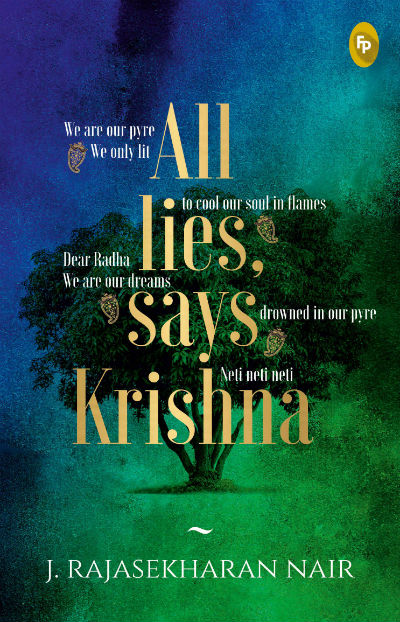Lord Krishna is one of the most fascinating Gods (or incarnation of God to be precise) around the world. You can love or admire him in the form you like. He is the one who is praised even for running away from the battlefield – for the greater good of the people of his kingdom, of course; and known as Ranchhod. He is the one whose love stories fascinate generations. His life reflects the emotions and wishes of a person just entering into adulthood. At this age, one is at the peak of his abilities and doesn’t think of anything as inconquerable. Krishna is referred
Today, on the auspicious occasion of Janmashtami, when we are celebrating the birthday of Krishna, (he is the one who doesn’t mind if you don’t address him always as the “Lord” 🙂 ); I found it the right time to share my unbiased review of a book which tells a story involving Krishna.
I am referring a book named All Lies, Says Krishna By J. Rajasekharan Nair (published and provided by Fingerprint Publishing in exchange of a honest and unbiased review).
| Book Title | : | All lies, says Krishna |
| Author | : | J. Rajasekharan Nair |
| Publisher | : | Fingerprint Publishing (3 June 2019) |
| # of Pages | : | 344 (Paperback) |
| # of Chapters | : | 41 |
| Purchase Link(s) | : |
Not only the title of the book is intriguing, but its synopsis is also interesting too. But does the entire book that much interesting, and does it live up to our expectations? Well, the short answer can be in a word Yes/No. But, let us elaborate on various attributes of the same so you can reach to the conclusion.
This Is Here In For You
Book Cover:
Being the door to the fictional world explored within, a book cover plays a vital role in book reading and purchasing decisions.

All Lies, Says Krishna By J. Rajasekharan Nair | Book Cover
The front cover of All Lies, Says Krishna looks pretty interesting. The way the green, golden, black and white colors are used to create an impact, makes it interesting. The book theme is – Lord Krishna, after many years of the battle of Kurukshetra, returns back to meet Radha. It was a dark night and the tree associated with their childhood (or early young age) memory also referred during their conversation. The cover page tries to represent this theme pretty effectively. Also, the slogans/phrases mentioned around each word has its own meaning. A very thoughtful cover.
Book Plot:
After many years of the deadliest battle of Kurukshetra which wiped out almost all the major kings and clans from the Earth to make it like an empty slate to write a new story from the begging; Lord Krishna pays a visit to Radha, his long lost friend, philosopher and guide, with who he can be himself.
In his early childhood days, Krishna left Gokul. It was the time when a call from Mathura made him to go there fighting a Kushti. While many believed that it was just a visit of Krishna from Gokul to Mathura, Radha and others knew that they are seeing their favorite person in the town for the last time.
Well, life moves on. Our personal feelings cannot change the course of life. And thus, we also need to move on with life. Radha is no more a young girl, nor Krishna is a boy who used to break earthen pots to eat butter. He became a legend and Radha also had her own life.
Their feelings for each other, however, remains the same.
Radha, like everyone else, was intrigued by hearing about the incidents happened in Aryavarta, especially the incidents which led to the deadliest battle of Kurukshetra, known as Mahabharat (aka Mahabharata). She knew that legends may contain many superlative explanations which are actually far from the reality. And, Krishna is the only person who witnessed it all. And, if asked, he can reveal the truth.
She asked her many questions about the battle, the lives of people associated with the battle, the people who are the reasons for this battle to happen, and many more. And, Krishna told her that a lot of lies has been spread, and he reveals the fact about almost all the major incidents during his conversation with Radha.
I want to avoid spoilers as much as possible and thus will leave it for you to explore these different versions of incidents noted as the part of the epic – Mahabharata. But, I can surely tell you that you will meet Kanna, Ashwathama, Shikhandini, Bheeshma, Drona, Draupadi, Kunti, Shakuni, Gandhari, Dhritarashtra, Duryodhana, Pandavas, Karna, and many others…
Mahabharata fascinates storytellers around the world, especially in India, to explore it and revisit the incidents. And, more importantly, retell them.
Ask any genuine scholar in India who loves to tell stories and he/she will reveal that his ambition is to tell/retell the story of Mahabharata from his/her perspective.
And, there is nothing wrong in it. Indian culture, unlike other civilizations, actually encourages the people to explore the things from their perspective. So, you can keep telling and retelling it from your perspective, and no one will object you. Of course, there is a thin yet strong line which you shouldn’t cross. Again, there is no thumb role and no one is going to hunt for you if you cross the line, as the faith of Hinduism always believes in “कम् सत् विप्रा बहुधा वदन्ति|”. The author or storyteller, however, must remember that the prime characters of all the epics are quite dear to the people of the civilization. They consider them not only Gods or humans, but, their loved ones. And, thus they are emotionally attached to them. So, you need to be careful to not to be disgusting or pathetic while enjoying your liberty to re-imagine and re-tell these epics.
The tellings and retellings by many modern day authors are widely welcomed by the readers. A group of them is of rebels – who love everything which is out of the traditional lines, thinkers – who are intelligent people who know what to accept and what to leave and they admire the right to explore as well, and unknowns – who actually hadn’t read any authentic version of scriptures, and thus have no point of view of their own.
When your intentions are good, you will mostly be admired by the readers, regardless of the version of the story you explore.
There are many interpretations of Mahabharata which are unconventional and yet quite popular. Be it Ajaya – by Anand Neelakanthan or Bhimsen by Prem Panicker.
All Lies, Says Krishna By J. Rajasekharan Nair falls in the same category, but, it crosses lines at many places and all readers may not welcome it. In terms of literary aspects, the book has some really nice features, but in terms of incidents and exploration, there are many things which he could have avoided.
While I like the portrayal of Shikhandini and Shakuni’s characters, some stuff about Kunti, Pandava, and even Vidura and Dhritarashtra is quite out of bounds. Pandavas raping her newlywed bride, sleeping next to their mother; or Kunti married to impotent Pandu, making out with any random stranger in front of him and killing him after she is finished; Bheeshma’s feelings when seeing Naked Draupadi in the Rajsabha; are some of the incidents which go too far.
The book brings in some really effective life-learning lessons. I like the following lines, especially the essence of wisdom in them:
“Memories, they never leave us”, she said, pulling him out of his world of reminiscences.
“And we grow by forgetting”.
The sadness of Bheeshma which he held within throughout his life is represented in the following lines quite effectively
The vows of Devavrata grew taller than him. Quite often people revered his vows but missed him completely.
Of course, his decisions played a vital role in what happened in not only his own life but also many other lives, and leading them to the battle of Kurukshetra. But, there are many factors played along with. He and his vows are one of the reasons for the battle of Kurukshetra for sure, but not only the sole reason for sure.
The storyteller has his/her own perspective for the story he/she explore. And, there are no two thoughts about the fact that he/she must have his/her own prejudices, likes, and dislikes for them for sure. It is all about human nature. The author is very true when he says:
Every tale fools you in one way or the other, though the storyteller never wants it to be like that.
The helplessness of Drona is represented in the following line in impactful manner.
Poverty demeans you, however great you are, he realized.
Only a person who experiences such circumstances know the pain and what it is to be unable to feed healthy food to your family, which is dear to you, even more than your own life.
I also like the bitter truth and sad fact about the bed of arrows where Bheeshma lived his last tragic moments; and the way it is presented in the following line.
It is another colourful lie. The bed of arrows was his life and death his reprieve.
The philosophy represented in the following lines, are quite reflective of the way of thinking of Lord Krishna’s character.
A vow is the product of a context. Any vow. And, every vow needs to be breached when the context changes. It is life, not vows, that takes life forward.
Not for nothing, he is known as Lord Krishna, the thinker, and strategist no one can match up to.
The way, the tradition of Swyamvar is represented as the liberal way of life, maybe countered with the following thoughts mentioned in the book, and they are quite logical.
“It is your declaration of freedom to choose your husband.”
“If I have the freedom to choose my husband, I would have invited only one man. … Now I am forced to witness the ugly competition among many men, unknown to me, to win me. I have to keep smiling while their lustful eyes feast on me; all this in the name of my freedom to choose my…”
The book also reveals the brutal truth of life and relations in a simple yet effective manner.
No one saves anyone, dear. No one can, No one has. No one will.
The way Krishna lived his life, everything in odds, since his birth to his death, is reflected in the following lines very beautifully.
Don’t think of death while you are alive. Experience life till you take your last breath. And, experience life even in the last breath.
Think of a boy who was born in a shady thunderous night, lived away from his real parents in a small village, made his own marks, became a legend, fought his own battles and even fought for others, sometimes when no one had the courage, he initiates, had seen his clan being wiped out in front of him, met with his own death in unexpected circumstance; how could he has lived his legendary life if he didn’t believe in the spirit of life and the philosophy of living all the moments of life with utmost cheerfulness?!
I also like the way the author has brought in the following lines
Who really knows, and can swear,
How creation came, when or where!
Even God came after creation’s day.
Who really knows, who can truly say,
When and how did creation start?
Did He do it? Or did He not?
Only He, up there, knows, may be;
Or perhaps, not even He…
It is actually a translation of the following lines from Rigveda…
नासदासीन्नो सदासीत्तदानीं नासीद्रजो नो व्योमा परो यत् |
किमावरीवः कुह कस्य शर्मन्नम्भः किमासीद्गहनं गभीरम् ॥ १॥
…
को अद्धा वेद क इह प्र वोचत्कुत आजाता कुत इयं विसृष्टिः |
अर्वाग्देवा अस्य विसर्जनेनाथा को वेद यत आबभूव ॥६॥
इयं विसृष्टिर्यत आबभूव यदि वा दधे यदि वा न |
यो अस्याध्यक्षः परमे व्योमन्त्सो अङ्ग वेद यदि वा न वेद ॥७॥
I also like the following line which is simple, but, holds an essence of philosophy and we need to implement it in our day-to-day life also.
How can you disturb me unless I allow you?
And this one too.
The best way to desensitize any issue is to shed its secrecy.
Many people who are having a long life with his/her companion and lived through their differences for the greater good of their family, and even more importantly because of his/her love for the companion, will understand the depth in the following line:
I cannot think of a life without her. But I am afraid of the life with her.
And, how many times a layman think the following…
It is a strange world where the deserving is always denied what is due to him and the reluctant is made to accomplish what he shies away from.
The explosive situations created through history and modern days, in the name of religions and ways of living, are reflected in the following lines.
It is difficult to understand dharma,
It is easy to understand dharma but difficult to understand its interpretations.
So, by now you must have got an idea about the quality of writing you can expect in the book. Some characters are really explored in quite an interesting way. Strong female characters who speak their minds are also some of the positive aspects of the book. I also don’t want to comment about the major incidents of Mahabharata the author could have included in the book, as it is solely the author’s domain.
I strongly feel that the author could have taken care in naming characters like Kanna, Ashwathama etc. (their name spellings). I understand that in some dialects s/sh are interchanged and so on, but when you pen down a book, you have to think in a different manner.
Summary:
A book which is good at many literary aspects for which you can go for, only if you can read with an open mind and can accept some portrayals which are challenging to your way of thinking. Strictly for adult (especially mentally) readers who can digest some stuff which they can find pathetic or disgusting in some senses.
Around 6 stars out of 10
Quick Purchase Links:
Over To You:
If you already have read the book do share your remarks and thoughts via comments below. Does this review help you in making your decision to buy or read the book? Do not forget to share this article with your friends over various social networks via Twitter, Facebook and others. And yes, you may like to subscribe to our RSS feeds and follow us on various Social networks to get latest updates for the site to land right in your mail box.
 ThinkerViews – Views And Reviews Personal views and reviews for books, magazines, tv serials, movies, websites, technical stuff and more.
ThinkerViews – Views And Reviews Personal views and reviews for books, magazines, tv serials, movies, websites, technical stuff and more.



